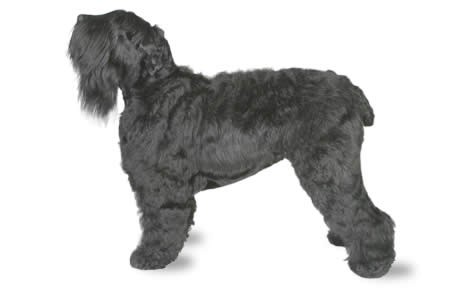Black Russian Terrier Breed Guide

Breed Group:
Working Dogs
Get 30% off
Join our Newsletter
Sign Up Today
Black Russian Terrier Background Info and History
The Black Russian Terrier was developed in Russia after World War II. This breed was created in the state-operated Red Star Kennel in Moscow. Black Russians have an interesting pedigree that includes influences from 17 breeds, including the Giant Schnauzer, Rottweiler, Newfoundland, and Airedale.
The Black Russian was created to serve as an all-purpose military and police dog that was adaptable to the harsh Russian climate and easily trainable. The first Black Russian Terriers were exported to the United States in the 1980’s and recognized by the AKC in 2004. This is a large, imposing breed that can weigh up to 140lbs and stands nearly 3 feet tall.
Black Russian Terrier Temperament and Personality
Black Russian Terriers were created with the single-minded purpose of developing a dog that was intelligent, trainable, powerful, and had strong protective and guardian instincts. The Black Russian has all of these traits, yet is known by owners as a loving and loyal family dog.
Black Russian Terrier Training Tips
Black Russian Terriers were bred with trainability in mind. They are an exceptionally intelligent breed that learns new commands with ease. Training should be started from a young age and continually reinforced.
Black Russian Terriers will also need to be socialized with other dogs and people from a young age. This breed can be aggressive towards other dogs and exhibit strong protective habits that can be problematic.
Exercise Needs of Black Russian Terriers
Black Russians require two half-hour sessions of exercise a day to be happy. This breed is intolerant of heat, so exercising in hot climates should be done with care.
Black Russian Terrier Lifespan
Black Russian Terriers live anywhere between 10-12 years.
Breed Popularity of Black Russian Terriers
The Black Russian Terrier is the 119th most popular AKC registered breed.
Feeding Requirements of Black Russian Terriers
Feeding requirements for the Black Russian will vary greatly depending on the size of the dog and activity level. Black Russians can weigh anywhere between 80 to 140 lbs., so feed according to their specific size. Be sure to choose a high-quality food source with a good balance of healthy proteins and fats, and avoid any grain-based fillers.
Black Russian Terrier Grooming
Black Russians will require brushing on a weekly basis, and professional coat grooming roughly every 8 weeks depending on the length of the coat.
Are Black Russian Terriers Good With Kids?
While Black Russian Terriers can make a wonderful, loving addition to the family, their size and generally protective nature require that play with children be supervised.
Health Problems of Black Russian Terriers
Hip Dysplasia
Black Russians, like many other large dog breeds, are known to suffer from hip dysplasia. Hip dysplasia in dogs is a condition that occurs when the fit between the femur and pelvis in the rear hip assembly is too loose.
The laxity in the hip assembly results in uneven wear on the cartilage that pads these bones. Hip dysplasia is an especially painful condition in older dogs, as the cartilage wear leads to arthritis, bone spurs, and eventually canine lameness in the hind legs.
Elbow Dysplasia
Elbow dysplasia in dogs is a condition where the radius and ulna (elbow and wrist) have an improper fit. Unlike hip dysplasia, elbow dysplasia generally manifests at a much younger age and is first seen in adolescence.
Signs of elbow dysplasia include slow recovery following exercise, lameness in a front leg following exercise, and reluctance to put weight on a front leg. Although the cause of elbow dysplasia is unknown, it is believed to have a genetic component and is prevalent in many Black Russians.
Hypoadrenocorticism (Addison’s Disease)
Addison’s disease is a condition where the adrenal gland fails to produce sufficient amounts of cortisol and aldosterone. Addison’s disease is known to be extremely hard to diagnose, as the symptoms of this disease mimic many other health conditions.
Symptoms can include weakness, vomiting, weight loss, anorexia, trembling, and increased thirst and urination. Addison’s disease is known to have a genetic component and has been seen in a number of Black Russian lines.
Other Resources
National Breed Website: Black Russian Terrier Club of America
Rescue: Black Russian Terrier Rescue
